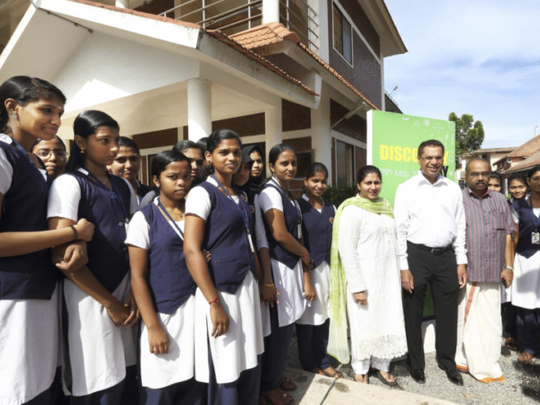
The new era of philanthropy is not about handing out cheques to charities, it’s about rolling up your sleeves and actually playing an active role in shaping the future of individuals, communities and even countries.
Successful entrepreneurs across emerging markets are seeking to create a bigger impact on communities by re-investing the private proceeds from their business in tackling large-scale problems such as poverty, water shortage, hunger and health-care issues with long-term sustainable solutions.
Take Kathy Ku, a 22 year old Harvard student, whose start-up company Spouts of Water is not headquartered in the Silicon Valley but in Kumi village, Uganda, where she makes inexpensive clay water filters and sells them locally to the 10 million population that does not have access to clean water and where waterborne diseases are the number one killer of children under the age of five.
Closer home in the UAE, meet another philanthropist — Faizal Kottikollon, founder of the Faizal and Shabana Foundation. Kottikollon’s day job is being the Chairman of KEF Holding, a DIFC-based company that invests in infrastructure, health care, education, hospitality and agricultural sectors in the UAE and India. Faizal and his wife Shabana are also the founders and active board members of the Faizal and Shabana Foundation, set-up in 2007. Their vision — to build a platform for individuals and corporate to bring their own unique skill sets to the table, work together and drive actual change… change that would impact the public education system in India and empower a generation of leaders who are not sunk deep in school and college debts before they even step out into the world.
Mission possible
Since 2007, the foundation has been involved in multiple projects in India and the UAE with an emphasis on education. Mission 100 is one such flagship initiative in partnership with the government of Kerala, and is the brainchild of local MLA Pradeep Kumar. Mission 100 seeks to empower marginalised students studying in government schools by providing upgraded school facilities (chemistry and computer labs and gymnasiums), learning aids and qualified teachers. The students’ learning experience is enhanced through extracurricular activities including physical and mental exercises and by encouraging them to pursue creative interests.
Kottikollon says, “We set up the foundation to give back to society. My wife and I have been on the lookout for specific projects that we would like the foundation to be involved in.
“We heard of the Promoting Regional Schools to International Standards through Multiple Interventions (PRISM) project and felt there were synergies in our goals. After all, government school students are mostly children whose families cannot afford private education and eventually most of them drop out of school, either due to lack of funds or are forced into child labour.”
He adds, “Our foundation wants to be an instrument of change. I know that rebuilding/upgrading 100 government schools in Kerala by 2019 is a mammoth task, but the challenge is what makes this project even more exciting.”
Under the Mission 100 project, the foundation has completed the renovation of the Government Vocational Higher Secondary School, Nadakkavu, Kozhikode, for Dh9 million. This 120-year-old government school was revamped in a record 95 days, without disruption to the students or teaching schedules. Currently, the foundation is working on rebuilding three government schools shortlisted by the PRISM project.
Improve education capacity
According to research by McKinsey Global Institute, low-income young adults want to be upskilled, but are unable to pay the training costs upfront. The result is that millions of young adults in India are unnecessarily trapped in poverty. They are confined to temporary jobs in the informal sector and earn less than $1 a day (about Dh3.67). By 2020, without a drastic change in education capacity, India will experience a labour shortage of medium-skilled workers. 285 million Indian adults will not have a high school education and hence will need appropriate training to secure medium-skill jobs.
Teaching a generation of young people to read and write is not enough these days,” says Kottikollon. “We need to teach them the skills required to perform their job and earn a living.”
Social impact
Mission 100 is an ambitious project that does not come cheap. It is expected to cost Dh600 million, with 50 per cent being funded by the government and the balance 50 per cent by the foundation and other independent donors.
How does upgrading school facilities and offering quality education impact the community? If the foundation and the Kerala government successfully upgrade 100 government schools, they will directly impact the lives of 250,000 students who study in these schools each year.
If you calculate the social impact ratio of Mission 100 as one is to ten; then for every one million people directly impacted by this initiative, about 10 million people will be indirectly impacted.
— Special to GN Focus


